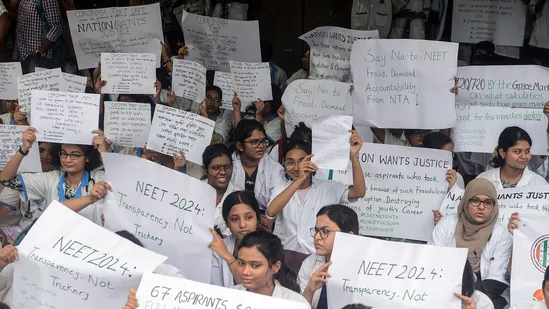In an effort to curb the widespread issue of exam malpractice, the Indian government has introduced the Public Examinations (Prevention of Unfair Means) Act, 2024. This legislation, effective from June 21, aims to ensure the integrity of public examinations, including NEET 2024, by imposing stringent penalties on those involved in cheating and paper leaks.
Overview of the Public Exams Act 2024
The Public Examinations (Prevention of Unfair Means) Act, 2024, was introduced amid growing concerns about the integrity of high-stakes public exams, such as the National Eligibility cum Entrance Test (NEET 2024) and the University Grants Commission National Eligibility Test (UGC-NET). These exams are crucial for aspiring medical professionals and academics, respectively. The new law targets various forms of malpractice, including paper leaks, cheating, and tampering with answer sheets.
Key Provisions and Penalties
Stricter Punishments
One of the most significant aspects of the new law is the imposition of severe penalties on individuals involved in exam malpractice:
- Jail Terms: Individuals caught leaking exam papers or tampering with answer sheets face a minimum jail term of three years, which can be extended to five years.
- Fines: Offenders will also be subjected to fines of up to Rs 10 lakh.
Non-Bailable Offences
All offences under this Act are classified as cognisable and non-bailable. This means that authorities have the power to arrest individuals without a warrant, and those accused cannot seek bail as a matter of right, thus ensuring a stringent legal framework to deter potential offenders.
Accountability for Service Providers
The Act places significant responsibility on examination service providers. Those who possess knowledge of a potential offence but fail to report it can be fined a hefty Rs 1 crore. This provision aims to ensure that service providers are vigilant and proactive in preventing malpractice.
Targeting Organised Crime
The law also takes a harsh stance on organised cheating:
- Senior Officials: Senior officials within service providers who knowingly participate in or facilitate cheating activities face a minimum jail term of three years, which can be extended to ten years, along with a Rs 1 crore fine.
- Examination Authorities: Examination authorities or service providers involved in organised exam malpractice can be imprisoned for a minimum of five years and a maximum of ten years, accompanied by a Rs 1 crore fine.
Protections for the Innocent
To prevent unjust punishment, the Act offers protections to individuals who can demonstrably prove that the offence was committed without their knowledge and that they took reasonable steps to prevent it. This provision ensures that innocent parties are not unduly penalised.
The introduction of this law comes in the wake of several high-profile exam controversies. Notably, NEET 2024 faced allegations of question paper leaks, particularly in Bihar. Approximately 24 lakh candidates appeared for this exam, which is a gateway to medical colleges across India. Similarly, the UGC-NET was cancelled due to suspicions that the exam’s integrity had been compromised.
These incidents highlighted significant vulnerabilities in the examination system, prompting the government to take decisive action. The National Testing Agency (NTA) also postponed the June edition of the Joint CSIR-UGC-NET, citing unavoidable circumstances and logistical issues. This test is crucial for determining eligibility for research fellowships and PhD admissions in science courses.
Implications for Stakeholders
Examination Bodies
The new law mandates that examination bodies such as the Union Public Service Commission (UPSC), Staff Selection Commission (SSC), railways, and banking recruitment examinations implement robust security measures to prevent malpractice. These bodies are now under increased scrutiny to ensure the integrity of their exams.
Service Providers
Service providers involved in the logistics and administration of exams must enhance their vigilance and reporting mechanisms. The threat of a Rs 1 crore fine for failing to report potential offences is a significant deterrent, encouraging a proactive approach to maintaining exam integrity.
Students and Aspirants
For students and aspirants, the new law provides a sense of security, ensuring that their hard work and merit are not undermined by unfair practices. However, it also places the onus on them to avoid involvement in any form of malpractice, as the penalties are severe and non-negotiable.
The Public Examinations (Prevention of Unfair Means) Act, 2024, represents a significant step towards ensuring the integrity of public examinations in India. By imposing stringent penalties on offenders and holding service providers accountable, the government aims to restore faith in the examination system. This move is expected to deter malpractice and create a fairer, more transparent examination process, ultimately benefiting millions of students and professionals across the country.
The NEET 2024 exam, being one of the most significant exams affected by these changes, will particularly benefit from the enhanced security and stringent penalties. This will help ensure that the integrity of NEET 2024 is upheld, providing a fair and just examination environment for all candidates.
For further insights and comprehensive content, please visit our homepage




2 thoughts on “NEET 2024: New Law Cracks Down on Exam Malpractice with Severe Penalties”
Comments are closed.